On the Names of Christ: Introduction to Book 1
On the Names of Christ: Book 1
Dedication to Don Pedro Portocarrero of His Majesty’s Council
and the Holy and General Inquisition.
The calamities of our times are many and numerous, and not the least of which, Illustrious Sir, is that men have come to a state whereby what once was a medicine and a cure has become a poison which is also a clear indication that the end is near, and that death is at hand, for these signs are found in the midst of life.
It’s a case worthy of note that what we call Sacred Scriptures were inspired by God through the prophets who wrote them as a consolation in the travails of this life and a clear, faithful light in its darkness and error that we should have a suitable cure for the wounds that passion and sin cause in our souls. And since He wrote them for this purpose which is universal it is also manifest that He intended that their use should be common to all and thus He did his part because he composed them with simple words in a language that was the common tongue for the ones to whom it was first given.
Afterwards when these men along with the true knowledge of Jesus Christ this treasure was communicated and passed on to the gentiles, He made sure that they were translated into many languages and in almost all of those which were more widely known and held common so that they could be enjoyed commonly by all. Thus in the very beginning of the Church and not many years afterwards it was a great fault if each one of the faithful did not occupy themselves with the reading and study of the Divine books. For this reason the ecclesiastics and the so-called secular orders as well as the learned and the unlettered dealt so much with this knowledge, that the care the zeal of the common people aroused the study of those who are teachers by profession, I mean, the prelates and bishops, those who ordinarily declared the Holy Scriptures to the people at church, therefore the particular reading that one had at home enlightened with the light of that public doctrine as if taken up in the teacher’s voice but without error and was the cause of great advantage. Which was as good as the government and the fruit responded to that which was sowed as those who have some acquaintance with the history of those times know.
But as I was saying this thing which is so good in itself, and was so useful at that time is an occasion for much danger as our sad times and the experience of our great misfortune teach us. Thus those who govern the Church have placed a certain and duly measure in this business ordering that the Sacred Scripture not circulate in vulgar languages so that the common people could read them. And so that like rude animal-like people that either are not familiar with these riches or if they do they do not make good use of them, they have taken them out of the common people’s hands.
If one may marvel and in truth it its something to marvel at that among a people of the same religion it should happen that something which was once of great advantage to them has become something dangerous and mainly in things of such importance that if he were to look in to the origin of evil getting to know its sources I would say at least to my mind that the causes are twofold: ignorance and pride, pride more so than ignorance. The Christian people have fallen little by little into these evils from their primitive virtue.
Ignorance has been on the side of those whose business is knowledge and declaring these books and pride on the side of the same and everyone else though in a different manner for in these pride, honor, and presumption and the title of professors which they presumed about without deserving it blinded their eyes that they neither noticed their own faults nor did they become convinced that it would be well for them to take care to study and learn what they did not know or promised to find and this same attitude not only affected the latter by taking away their will to be instructed in such literature and books but they became convinced that they too could know and understand for themselves. Thus the people thought themselves masters and the former not being able to be what they were or should be, light became darkness so that among the people reading the Scriptures became an occasion for conceiving many very pernicious errors that were bubbling up and being discovered at ever hour.
But as the church prelates could take the Scriptures from the unlearned they could also place and set them at the attention, desire and understanding of those that are to teach them, this misery would not have to be cried over as much. These ones being like the heavens, rich and full of the virtue of this treasure, a great good could be derived for the lesser which are the soil on which they have influence. But for many this is in reverse in that they not only do not know the Books they either despise them or they do not seem to show much appreciation for those who are familiar with them. And bloated and content with a little taste of certain propositions they have the title of professors and theologians and they do not have any of the Theology. The beginning of which are the propositions of the Scholastics and the nourishment of doctrine which the saints write about and the height and perfection of which are the Sacred Letters to whose understanding everything before is ordered as a necessary end.
Yet leaving these and taking up the subject of the common people this damage by which they became useless for the reading of Scripture another, I do not know if a worse one, has followed: they have given free reign over to the reading of thousands of books which are not only worthless but definitely damaging which have grown in our age more than any other as by the art of the devil as well as the lack of good books. And it has happen to us like the earth which when it does not produce wheat it gives way to thorns. It would say that this second danger is greater than the first, for in the former men lose a greater instrument to be good in the latter but in the former it makes them apt for evil, there the control of virtue is loosen, here vice is egged on. For if as Saint Paul alleges bad conversations corrupt good manners what won’t a harmful book do that converses with who reads it all the time and at every hour or how could someone who nourishes themselves off of weeds and poison not end up with a vicious and evil demeanor?
Truly if we wish to look into it with attention and be just judges we cannot but find that a great part of the backsliding and perdition that is found continually in our manners comes from these disconcerting, books. And the zealous for God find in them a flavor of paganism and faithlessness- that I do not know if in any age of the Christian people has been felt as strong- in my judgment the source and cause of it all are such books. It is a case for great compassion that many simple pure people are lost in this before being warned about it, and without knowing how or why they find themselves poisoned and they dash themselves on this hidden bolder. Since many of these writings usually circulate among young damsels and girls and their parents do not pay it any mind for which all the rest of the candor they have comes to not.
Therefore since the writing of sound doctrine has always been beneficial which awaken souls and lead them towards virtue in this time it is so necessary in my judgment that all those in whom God has placed for such a task have the obligation of busying themselves with it, writing in our language for common use some things which are either inspired by the Sacred Scriptures, close to or dealing with the same material so that they supplement them with the common task of mankind and that they take away the vain and dangerous books, replacing then with the more salutary books.
Although it is true that some learned and very pious people have happily worked on many such writings, full of usefulness and purity, but nowise should others who can occupy themselves in these efforts feel not obliged to do so nor for this reason alone should they put pen to paper for if all who could write wrote, all of it would be much less not only of what one can write on such matters but of that which, according to our necessity, should be written because man’s tastes and inclinations are so different as the evil writings are already so many and well-received at which the good writings are directed. As in war strongholds are laid siege and surrounded, attacked on all sides, with all the engines that the military discipline teaches us. It is necessary that this same thing be done by the good and learned minds of the times without one being careless (with another) in a bad use so towering and fortified as this one which we are talking about.
Thus I judge it and have always done so. And even I know myself to be the least among all those who can serve the Church on this matter I am talking about, I have always desired to serve in said capacity and I could, and on account of my bad health and many I have not done it until now.
But since my past busy and troubled life was an obstacle for me putting my desire and wisdom into action it does not appear that I should lose the occasion of this leisure which the injury and ill will of some people has placed me. Because though the travails that surround me are many but the long favor of heaven that God, the true father of the oppressed, gives me without deserving it, and the witness of conscience in the middle of the all have calmed my soul with such peace that not only in the amendment of my habits but also in the business and knowledge of truth. I now see and can do what I could not before. And the Lord has converted this travail into my light and health and through the hands of those who tried to do me wrong he has produced my good. To whose excellent and divine mercy I would not respond in the least with the corresponding gratefulness if that now that I am able, in the way that I can according to the weakness of my fancy and strength I did not put thought into this that to my judgment is so necessary for the good of his faithful.
For this purpose some conversations came to mind which in the past years three friends of mine from my Order, two of them men of great letters and mind, had amongst each other on a certain occasion about the names by which Jesus Christ is referred to in the Sacred Scriptures. Which one of them referred to me afterwards and because of their quality I could not forget them.
Wishing now to write something that was useful to Christ’s people it seemed to me that beginning by his names as a starting point is the most felicitous and best. And for the usefulness to the reader, the most advantageous and for my mind the sweetest material and most pleasing of all since Christ Our Lord is like a spring or better yet an ocean that comprehends in itself all the useful and the sweet that is distributed among men. Thus speaking about Him, as if to say unwrapping this treasure is the sweetest and most precious knowledge. And by the order of right reason this knowledge is placed before the rest of treatises and sciences. This wisdom since it is the foundation of all these and it is the target which the Christian directs all his thoughts and deeds and thus the first thing we should find a place for in our soul is for his desire and for the same reason his wisdom with which this desire is born, flames up and grows.
And the true and proper wisdom of man is to know much of Christ and in truth it is the highest and most divine wisdom of all because understanding Him is understanding all the treasures of God’s wisdom that as Saint Paul says: “are enclosed in Him” and it is to understand the infinite love that God has for men and the majesty of his grandeur and the abyss of his counsels without end and the invincible strength of his immense power with the rest of the greatness and perfection that dwell in God and are discovered and shine more than in any other part in the mystery of Christ. These perfections or a great part of them can be understood if we understood the force and meaning of the names that the Holy Spirit gives him in Sacred Scripture because these names are like small figures in which God has miraculously enclosed all that the human understanding can and should comprehend about Him.
For having put in writing afterwards what was spoken then as I review my memory, in almost the same way as it was told to me and as close as possible to the true events or their resemblance, I now send it to you Your Grace to whose service all my works are directed.
-Fray Luis de León

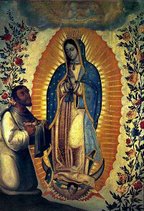
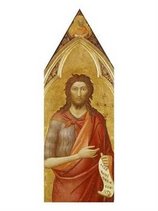


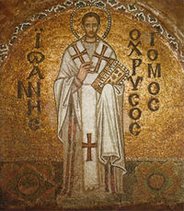
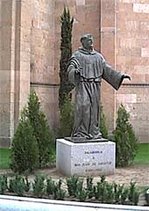

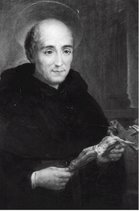
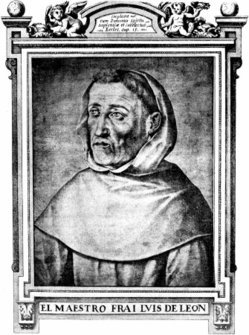




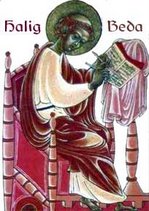
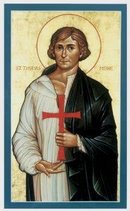
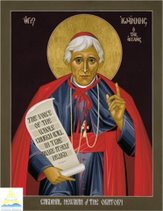




No comments:
Post a Comment